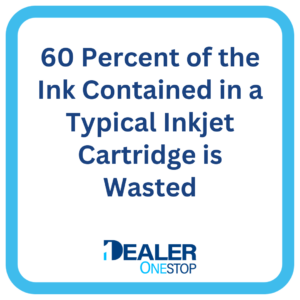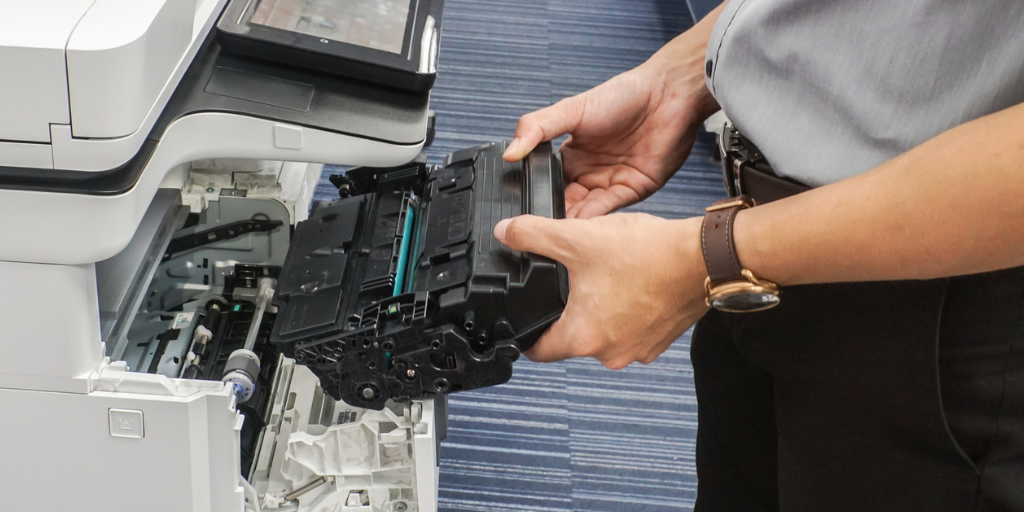The realm of automotive dealerships is already rife with expenses. Among these, one often overlooked cost is that of printer supplies. These can significantly dent the budget, particularly when not managed correctly. According to data from Dealix, dealerships can spend up to $60,000 per year solely on toner and ink.
What makes this issue more troublesome is the ordeal of poorly administered contracts. These often come adorned with hidden fees and surcharges for toner usage, exacerbating the financial strain even further.
Unfortunately, the actual utilization of printer supplies does little to alleviate this predicament.
The Pervasive Issue of Toner Waste
 The toner waste issue is a silent yet persistent threat to cost management within auto dealerships. Research findings from Epson, a leading brand in the printer industry, present a disturbing revelation. They state that nearly 60% of ink in a standard cartridge goes to waste. This wastage directly results from untimely discard prompts by printers, triggered by “low ink” alerts.
The toner waste issue is a silent yet persistent threat to cost management within auto dealerships. Research findings from Epson, a leading brand in the printer industry, present a disturbing revelation. They state that nearly 60% of ink in a standard cartridge goes to waste. This wastage directly results from untimely discard prompts by printers, triggered by “low ink” alerts.
Interestingly, these alerts are often set off when the ink levels are far from approaching a state of depletion. Consequently, ink cartridges are disposed of when a substantial amount of ink still remains unused. This inaccurate alert system, a default by the manufacturer’s setting, is a prime example of inefficient resource management.
Inefficiencies such as these burgeon operational costs for dealers, who are already grappling with tight budgets. When this wastage phenomenon is scaled to account for the large fleet of printers used in these dealerships, one can see how expenses can escalate rapidly. Toner prices are already inflated due to padding in supplier contracts, and the wastage issue further exacerbates the burden. Thus, challenges in the management of printer supplies, especially toner waste, warrant immediate attention and optimization.
The Persistence of Wasteful Practices
The reality is, that the auto dealership industry grapples with an ongoing pattern of wasteful practices. In light of the challenges they pose, one might expect concerted efforts to rectify these inefficiencies.
However, there is a notable absence of holistic, unified strategies to curb this waste. One reason for this is the widespread potential for sustainable practices within the industry, which remain primarily unutilized. For instance, toner recycling or new printer settings could play a significant role in waste reduction.
Employees and manufacturers contribute to waste persistence through their routine actions. For instance, workers may discard partially used cartridges because of misleading low ink signals, while manufacturers could improve printer warnings for ink levels.
Adding to the complexity, existing contracts with suppliers often carry hidden costs that directly contribute to wastage. Frequently, these contracts mask higher-than-necessary charges for toner, thereby quietly contributing to the cycle of waste. This habitual waste and lack of cost-saving strategies culminate in an industry-wide issue. Overcoming this will require a more conscientious approach from both manufacturers and employees, along with more transparent, cost-effective supplier contracts.
Moving Towards More Optimized Practices
The financial strain presented by printer supplies and their associated contracts calls for immediate action. Auto dealerships cannot afford to ignore the significant costs incurred through wasteful practices, poor supplier contracts, and inefficient printer use.
Undeniably, at the heart of effectively addressing this issue lie two key aspects: human behavior and supplier contract management. Both employees and suppliers play crucial roles in the conservation of resources. It is important for employees to be educated about accurate ink usage and mindful printing, thereby optimizing behaviors.
Following this, turning the spotlight on to supplier contracts, the time is ripe for revisiting and renegotiating these agreements. Indeed, many contracts hide onerous charges for toner—charges that quickly add up. A thorough review and renegotiation of these contracts could prove to be a game-changer, offering the potential for significant savings.
Moving towards a more optimized approach to managing printer supplies could unlock substantial financial relief for auto dealerships. The industry needs more efficient practices and transparent contracts for a sustainable future.
One solution is the Dealer One Stop Just-In-Time Toner Program:
CLICK HERE to get the full 10 Auto Dealership Blind Spots Causing Profit Leaks Report.








